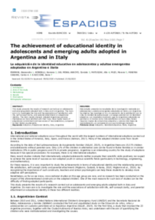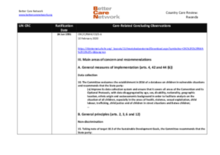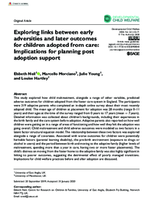Displaying 91 - 100 of 622
The present study aims to identify the adoptee, parents and family related predictors of the adoptive parents' parenting stress, exploring direct and indirect effects. Fifty Portuguese adolescents' adoptive parents participated in this study.
This review aims to provide social workers with a resource to guide their decision‐making by evaluating both the benefits and risks associated with open adoption.
This article explores contemporary Muslim Americans’ negotiations of Islamic law to find ethical ways to care for non-biological children within their household.
The purpose of this study is to (a) identify whether there are meaningful subgroups of families with distinct post-adoption needs and (b) determine which parent, youth, and adoption characteristics are associated with these collections of needs.
This study presents the results of research carried out on adolescents and emerging adults adopted both in Italy and in Argentina. The main aim is to investigate the role and the associations of satisfaction with life, self-concept clarity, and parental attachment on educational identity.
This study examined the behavioral adjustment of 52 Romanian adolescents domestically adopted.
The purpose of the present study was to examine differences in both internalized (e.g., worry and guilt) and externalized (e.g., anger and resentment) caregiver strain among biological, foster and adoptive caregivers, and assess the degree to which characteristics of the caregivers and the children in their care impact strain.
This Country Care Review includes the care-related concluding observations adopted by the Committee on the Rights of the Child and the Committee on the Rights of Persons with Disabilities, as well as other care-related concluding observations, ratification dates, and links to the Universal Periodic Review and Hague Intercountry Adoption Country Profile.
The aim of this review is to describe psychosis risk factors in adoptees, with a focus on difficulties with identity formation, identification with in-groups, attachment to parents, and coping with loss and with discrimination.
This study explored how child maltreatment, alongside a range of other variables, predicted adverse outcomes for children adopted from the foster care system in England.



